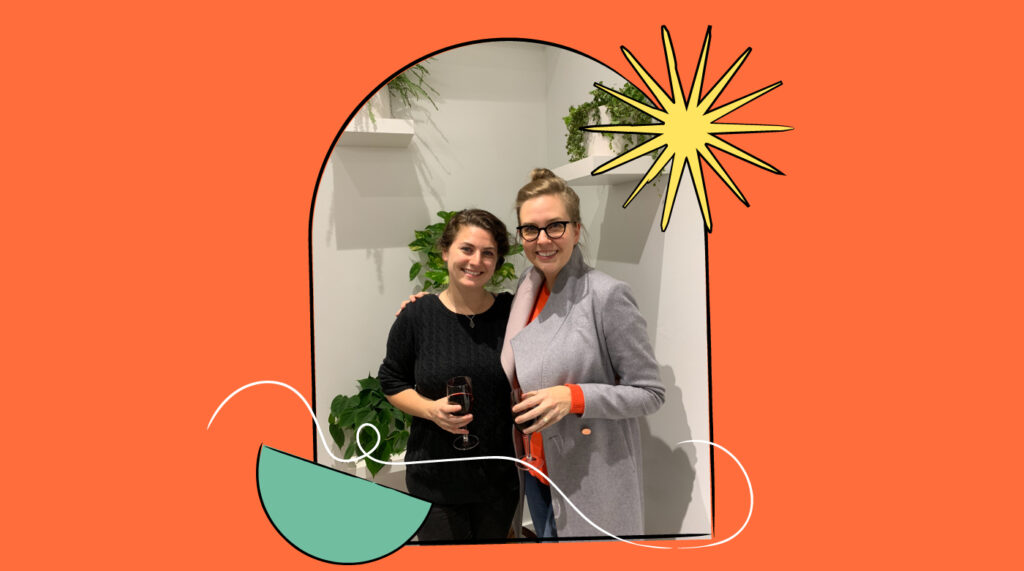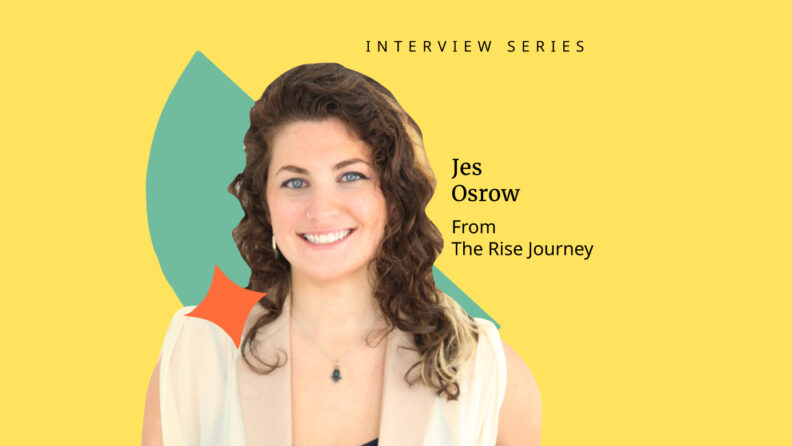We’re passionate about the world of work and how we can make it better. To help, we’ve launched an interview series where we pick the brains of experienced leaders, business owners, managers, and individual contributors to get their thoughts on how we can collectively build better workplaces.
Hi Jes! We’d love to get to know you a bit better, tell us a bit about your backstory.
Career-wise, I started out at a liberal arts college triple majoring in Fine Arts, Theatre Management and Spanish. It may seem out of place when you learn that I am the co-founder of an HR strategy and organizational culture consultancy. The Hill Magazine does a fantastic job bringing light to my entrepreneurial backstory in “A multifaceted leap from the stage to entrepreneurship.”
I sort of fell into an HR role. When I was 23 working my first full-time job in NYC, I was the executive assistant to the CFO of a sports startup and one day I was told to run payroll, start hiring people, and to implement an intern program.
From this role, I was able to get incredible hands-on experience. Undoubtedly, I made a ton of mistakes but I learned so much in the process. I witnessed a lot of glass ceilings getting shattered for women and many historic achievements for LGBTQ rights.
I also saw a lot of things that were far from great and not DEI-friendly in the slightest. That is what initially led me toward a career in HR and sent me down the path of trying to figure out how to make workplaces work for everyone and not just for a specific type of person.
In an interview with Authority Magazine, titled “5 Steps We Must Take To Truly Create An Inclusive, Representative, and Equitable Society,” I talk a bit about my experiences growing up and how they impacted my perspective on a lot of things in life and eventually helped me recognize that HR is somewhere where I could make a difference.
If we were to ask a friend to describe your personality to us, what would they say?
My mother always described me as a cruise boat director. She saw that I would perform my best when working with a team or a “crew” and be in the position where I am involved in every conversation. As she might describe it: I want to have my finger in every pie. I want to know everything that is going on, but I also want to enable people to do things well independently.
I probably could talk to a rock if I needed to.
To be able to show up and get things done is a valuable quality. When in doubt, take action and sometimes done is better than perfect.
Thinking back to your career journey, what’s an interesting story that stands out?
This story is set before I was working a full-time job and was instead working four part-time jobs. I was an administrative assistant to a former CMO of NBC Universal, an executive assistant to the CEO of a dance nonprofit, and I was also a nanny for an 8-year-old whose parents were world-famous artists.
The fourth job was working as a personal assistant to Sonja Morgan from The Real Housewives of New York. I remember when I first went into the interview, it was at her personal brownstone on the east side.
We were interviewing in her kitchen and her stylist came down to ask her to come upstairs to get ready for her next event. Sonja had me come and as I was walking upstairs to her bedroom I saw there were two other assistants having issues trying to sync Sonja’s phone contacts across multiple devices.
I said, ‘I'm pretty good with computers, let me see what I can do,’ and within about 20 minutes I was able to sync her multiple mac computers with multiple iPhones.
That got me the job. For me, that story reinforces what it means to be a person of action. To be able to show up and get things done is a valuable quality. When in doubt, take action and sometimes done is better than perfect.
What’s the most impactful lesson you've learned over your career thus far?
Take action. Bet that person that gets sh*t done.
I can't count how many times I've been offered an opportunity because I raised my hand and was the first one to say, ‘Sure, I will do it,’ and whether I figured it out later or I knew what was going on then and there, I jumped in. This has led me in my professional life and my day-to-day life.
My business partner, Jessica Lambrecht, describes me as a woman of action and I take a lot of pride in that because I do it intentionally and I do it to make progress and to move things forward.
Oftentimes you are afraid to start something and it feels easier to make excuses when, in reality, it's actually even easier just to open up a document and get started.

Thanks for giving us some insight into who you are! Let’s jump into things. When you hear the phrase “build a better world of work”, what comes to mind?
For me, building a better world of work means a workplace that isn't singular; it's grandiose. My mind goes to the movie, “Everything Everywhere All at Once,” and how many different scenarios are going on.
How do you become a workplace that is flexible and agile and that can change and evolve? It’s not from just one singular path, method, or technology.
When I talk about accessibility, a lot of people always assume it's immediately around disability. But it's bigger than that, and accessibility often gets left behind.
It's important to acknowledge that everybody works differently and accessibility can support everybody in a way that is not just safe and healthy, but enjoyable and, dare I say, fun.
When I think about how I work, I know when I am talking or doing interviews like this, it's always helpful for me to be moving. I just think more clearly.
Having something where I can keep my blood pumping is something that helps me work. I've never had a workplace enable that until Covid when we were given a WHF stipend and I was able to buy myself a treadmill for under my desk, which was fantastic for my regular health in addition to my work health.
Figure out how each person does their job well and then figure out how you can create an accessible environment for them to do it better than well.
Building a better world of work means workplaces where everybody can work and enjoy it. Whether someone wants to have a demanding career and aggressively work up the ladder, or just clock in and out, we need to be accepting of all preferences, make it work for them, and compensate them fairly.
(note: I'm a huge advocate for disability in the workplace, and talk a bit about how to support employees in an interview with HR Director and I also am an advisor for Chronically Capable and Dsclo.)
For you, what’s the main blocker you see as standing in the way of building a better world of work?
Ego! Ego has no place when it comes to DEI work. We need to be able to come to work as our authentic selves. The sooner we can do that, the sooner we can start making progress.
You should not be afraid to not know something—you should be excited to learn and have light shed upon topics that you are unfamiliar with. When you learn that you are not doing something correctly, own it.
There is nothing wrong with having an error or misjudgment as long as you acknowledge it and recognize the impact. Make space for the error, talk about it, pivot your thinking, and move forward with action. This creates a space where everyone is at ease and trust can be built because your values are worn on your sleeve and reflected in your actions.
What’s one thing within our control that we can practically do to build a better world of work today? And, how do you recommend going about it?
For C-suite, one thing you can control is budget. Give budgets! Look at what your budgets are for technology, engineering, recruitment, DEI, disability accommodation, etc.
Figure out where you can make changes and even things out. If you don't know what your employees need, do a listening tour. Listen to your employees and work with them to get their needs met.
Another thing you can control is making sure that people are being compensated equitably. If you are not 100% positive that there are no inequities, then you need to have someone externally run a pay equity audit to understand what's going on, who's being paid what, when, where, why, and how. Identify promotion priorities and what raises are taking place, etc.
Listening tours and pay equity audits are both things that you can control and something that you can take action on right now. I see firsthand how much these actions can impact the long-term success of a growing business!
Can you share one thing you’ve experienced, seen, or read about that is leading us toward a better world of work?
Collaboration as Leadership. The idea is to re-humanize the workplace.
I have seen this movement proliferate through social media in the form of sharing more personal stories. People are seeing each other in different lights. We are recognizing that our work and our lives are all intertwined and the more we can embrace that and celebrate that, the better.
When we can do better for all of our people, all of our people do better for each other.
DEI is a part of it, but it is not the only catalyst by any means. This type of movement is what gives me hope that more and more people will get on board and more people who believe that way now will become our future leaders. I am constantly thinking about how we can continue to push this idea forward in the workplace and beyond.
Thanks Jes! How can our readers follow your work?
Follow Jes Osrow on LinkedIn: https://www.linkedin.com/in/jesosrow/
Visit The Rise Journey’s website: https://www.therisejourney.com/
Access free HR resources through Rise With OPHR: https://www.risewithophr.com/
You can also subscribe to The Rise Journey’s newsletter to stay updated on new offerings to help empower workplaces.
Add your voice to the conversation
Join our interview series and share your ideas for how we can build a better world of work!


